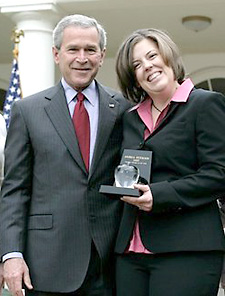
“As a child, I was surrounded by relationships that inspired me constantly—parents, teachers, community members, people at church,” she said.
Peterson called them models of excellence who embodied “the creation of community through service.”
She said today’s children are missing the key lessons her parents taught before she entered kindergarten: work hard, keep working despite frustration, and finish what you start (“My mom wouldn’t let me go to the next page in the coloring book until I finished the one I was working on.”)
“They taught me to apologize, to share, and to wait my turn,” Peterson remembered. “The truth is, every September I walk into my classroom and I meet first-graders who don’t know these things. They spend most of their early years in education trying to figure out how to survive without those tools, leaving precious little time for them to learn how to read and write.”
Peterson said her first mistake as a teacher at Monte Cristo Elementary School in Granite Falls, Washington, was to assume her students knew what excellence was. The lesson she learned: “You had better know your students. I assumed my students could paint a white snowman with a black top hat. I assumed that they would be able to spell ‘holiday’ correctly. But, most of all, I assumed my students knew what excellence looked like.”
They did not. When Peterson hired on with Monte Cristo in 1997, she confronted a culture of failure and a false student pride in being “losers.” The football team hadn’t won a game in recent memory.
“My students hadn’t seen excellence. They simply didn’t know what it looked like in any area of their lives. They had never had role models of success; they were missing that relationship necessary to achieve.”
Peterson zeroed in on the three “big buzzwords” in education today. Ironically, they constitute an alternative three R’s: Rigor, Relevance, Relationships. Unfortunately, she said, rigor and relevance get the attention while close relationships trail behind as a “warm fuzzy feeling” afterthought.
She contends that relationships must come first. They are the best way to discover what is relevant to children, and when parents, teachers and mentors understand what drives youngsters, “once we really know them, we can teach them to work hard, and concentrate, to think about their learning. The rigor that results will be astounding.”
At a recent meeting with chief executive officers in Washington, D.C., Peterson heard that major corporations worry that today’s high school graduates lack so-called “21st century skills.” The top five abilities business executives find wanting are concentration, teamwork, a hard work ethic, discipline and, most important to corporate leaders, critical thinking skills.
“The very skills my parents taught me when I was so young, the very skills I see lacking in my elementary students—these are the same skills that America’s corporations see lacking in our high school graduates,” Peterson warned.
A highly successful music teacher, Peterson adheres to a “no limit” standard of excellence in her classroom. She composes many of the musicals her students perform and they see her struggle through the creative process. “I share my frustrations, creative road blocks and bursts of creative energy with my students, inspiring them to achieve their own goals of excellence. Effective teaching allows students to gain skills in which they will be able to teach themselves in the future.”
Peterson’s visit was sponsored by the HSU Center for Educational Excellence, Collaboration and Inquiry; the HSU School of Education; the Humboldt County Office of Education; and the North Coast Beginning Teacher Program.